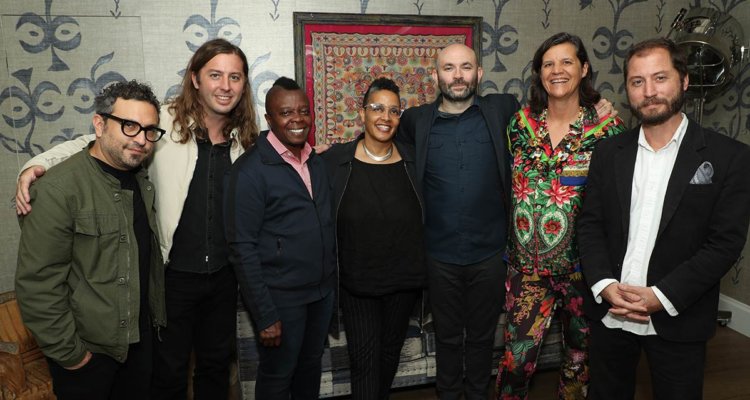In the pre-pandemic world, the leading lights of American nonfiction cinema would gather in Columbia, Missouri on the first weekend of March for the annual celebration of their craft known as True/False Film Fest. Across four glorious days, the programming would explore the innumerable definitions of this hazily defined discipline, but this year, the ongoing COVID-19 crisis forced the festival into outdoor venues elsewhere in the city for a somewhat truncated version.
And so there was an air of the cathartic at the Crosby Street Hotel in New York this weekend, as a veritable Super-Friends lineup of documentary filmmakers came together for the sort of state-of-the-industry panel they (and we) had all missed out on back in the spring. The Netflix–sponsored “New Directions in Documentary” evening began with a roll call from moderator Tabitha Jackson taking stock of the massive influence wielded by these trailblazers in their field: Bill and Turner Ross, co-directors of the barfly masterpiece “Bloody Nose, Empty Pockets”; Alonso Ruizpalacios, whose latest feature “A Cop Movie” comes online to the Big Red N later this week; Yance Ford, an Academy Award nominee for his fusion of the personal and political in “Strong Island”; Kirsten Johnson, of the boundary-breaking, widely admired “Cameraperson” and “Dick Johnson Is Dead”; and the man of the hour, Robert Greene, hot off the New York premiere of his new film “Procession” earlier that day. The lively back-and-forth proved the rich difference of opinions and ideologies onstage, but they were all united in their open-mindedness about all documentaries can be and do.
After a moment of silence and round of applause for the recently departed producer and patron Diane Weyermann, Jackson posed a tricky query to the assembled guests, challenging them to articulate their approach to filmmaking through an illustrative metaphor. Ruizpalacios shared a memorable anecdote about his infectious disease specialist father and a couple of friends wowed that the man had borne witness to the big picture of the coronavirus while everyone else occupied their own private corner of it; the director’s aspiration, as he tells it, is to “see the whole bug” with his films. Greene emphasized the overarching image of a family, how his process in films like “Procession” and his earlier “Bisbee ’17“ hinged on the establishment of a tight-knit group and the building of trust within it in shared pursuit of truth. That same theme figures prominently into Ford’s work as well, as he explained his search for “the essence of family, the nature of loss and its permanence, the thing that imprints on your body when it happens.” He later added that he’s looking for “the thing I have yet to be able to put into words.”

Camaraderie was alive and well among the colleagues, many of them friends or acquaintances from previous events much like this one. “We keep raising each other’s game!” Johnson said, addressing the question of a loose, informal “scene” comprised of her peers. “We all need to step up!” Their cohort was united by their collective notion that “it’s not enough to observe,” as Greene put it, summarizing their rejection of the fly-on-the-wall ethos’ false objectivity. Their projects involve a certain authorial molding of artifice to the ends of deeper honesty, in experiments like the staged deaths of “Dick Johnson Is Dead” or the stylized reenactments of trauma in “Procession.” “We think a lot about the historical nature of documentary,” Greene said. “I think we’ve got to talk about the future.” Or as Turner Ross would have it, this isn’t about cataloging the past. “It’s an act of discovery,” he said. “If there’s nothing to learn, what’s the point?”
Jackson closed things out with one last around-the-horn question, challenging each of the participants to name “a film that blew your mind because of what it was about and how it was put together, form and content.” Turner Ross shouted out the easygoing humanism of “Nashville,” and Bill paid homage to let’s-put-on-a-show pizzazz of “The Muppet Movie,” and the Muppets in general. Ruizpalacios picked “Who Framed Roger Rabbit?” and fondly reminisced about his first time laying eyes on Jessica Rabbit. Ford named the queer landmark “Tongues Untied” and spoke briefly about the under-recognized brilliance of its creator Marlon Riggs. Johnson recalled getting smuggled into movies by her dad in defiance of her Seventh-Day Adventist upbringing, once attending a festival of Australian cinema including “The Chant of Jimmie Blacksmith,” “Picnic at Hanging Rock,” “The Last Wave,” and much to her mother’s horror, “Mad Max.” Greene mentioned Chantal Akerman and Frederick Wiseman as his chief influences and reflected on a recent revisit to Albert Maysles, David Maysles, and Charlotte Zwerin’s Rolling Stones picture “Gimme Shelter.”
That film was set during a particular flashpoint in history, an idea that Greene seized on to close out the night. “We all know what moment of history we’re in,” he said. Johnson took it from there, tidily summarizing the vitality of today’s thriving nonfiction cinema: “Let’s stop pretending, and making stuff we already know is dead,” she said. “Let’s make stuff that’s as alive as possible.” The thunderous applause for her words acted as the hearty amen to this service, the congregants all joined through a belief in the healing, liberating power of the documentary.



